If I see one more person exclaiming how minimalism has changed their life for the better, I think I might scream.
Pinterest, TV shows, social media – it seems that everywhere everyone is proudly proclaiming that they’re switching to a minimalist lifestyle and everything in their life is so much easier and more wonderful now that they’ve found minimalism.
I tried to be a minimalist and all it did was make me miserable to a degree I can’t even explain (I’m so thankful I stopped when I did). That’s why I’m now proudly and happily a minimalist drop out. And I can unabashedly say that I hate minimalism (or at least what people are saying that minimalism should be).
What is Minimalism?
So before I proceed to tell you how minimalism was not the answer to a happier life for me, let’s first get an understanding of what minimalism is. Becoming a minimalist means a lot of things to different people.
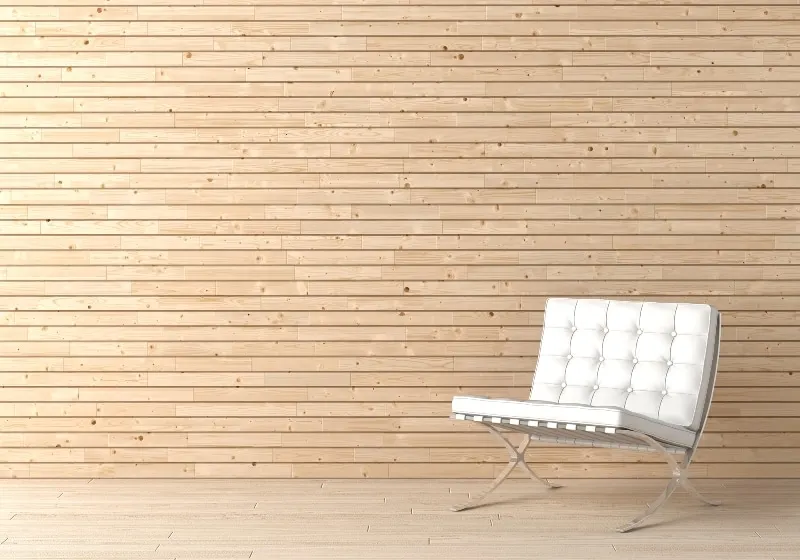
Minimalism is either one of the following (depending on who you are talking to):
- Getting rid of almost everything you own so that you don’t have to be stressed by keeping and cleaning possessions and other materialistic items
- Intentionally focusing on only what matters to you and removing everything that distracts you from what you love
Minimalism can be done in a variety of settings, too, including:
- Selling your home and buying a tiny home
- Minimalistic living in your own home
- Selling your large home and downsizing into a smaller home or condo
- Giving up everything and traveling, whether in an RV, van or hotels
When I say that I hate minimalism, I’m not talking about common sense decluttering and downsizing (here’s a helpful example of the differences). Lots of people think they are minimalists when all they’re doing is decluttering their life. I’m talking about the ideal of minimalism of *really* cutting back on everything in your life – living in a smaller house, giving up much of your belongings, etc.
In theory, minimalism sounds simple and great. Who doesn’t want less stress in their lives? Who doesn’t want more time? Who doesn’t want to save money by having so few things to spend money on?
It’s easy to get hooked into wanting to be a minimalist, especially when you see people traveling the world, sharing their gorgeous travel photos, proclaiming that their lives are free and happy because they’ve given it all up to focus on their dreams.
To which I would like to loudly cough and say ‘Bull S**t’ under my breath.
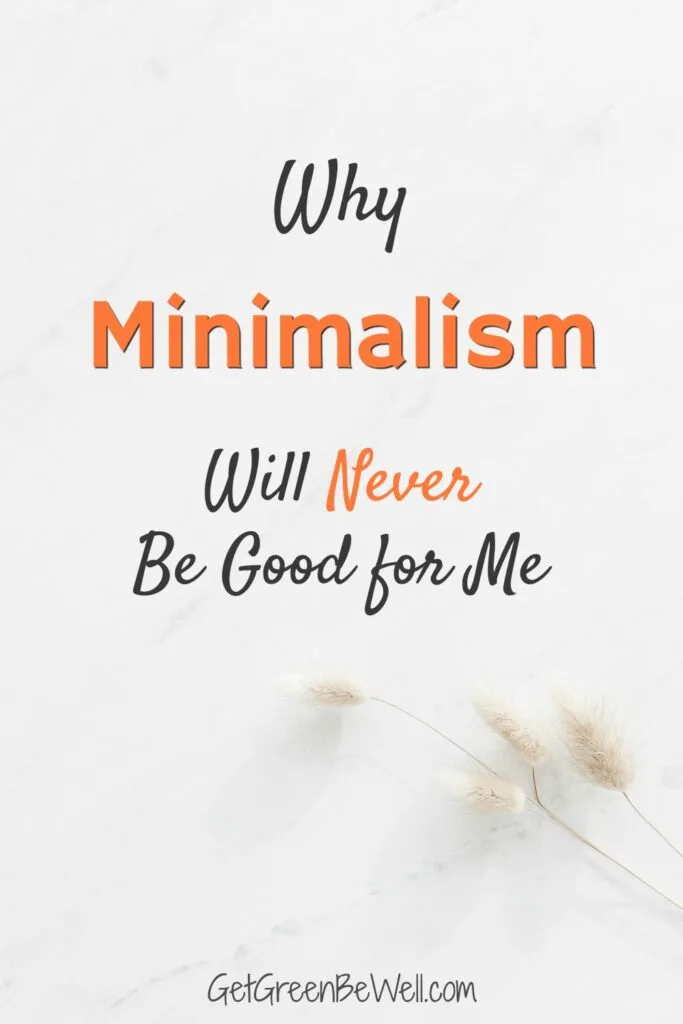
Minimalism Vs. Common Sense Decluttering
Our society seems to only see things in black and white lately. There is always a lot of shades of grey in between.
So our society has gotten to the point that either:
- You own WAY too much stuff and keep buying bigger houses to accommodate the stuff and rent storage units to store the stuff and need closets so big that they could be bedrooms on their own.
- People feel the need to get rid of everything they have, purge the majority of their life, and move into an over-priced tiny home with no possessions to keep their need for stuff at bay.
Can you see how there’s a lot of shades of grey in between these two completely different ideas?
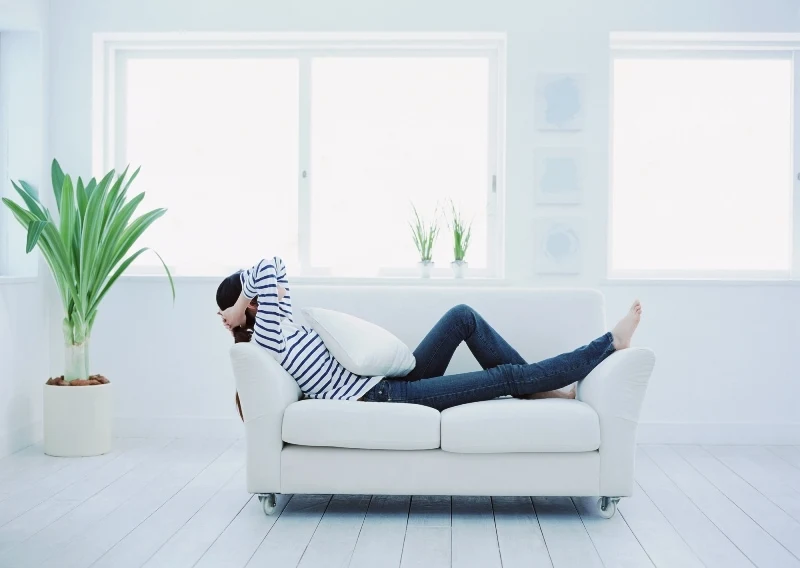
There’s a lot to be said for decluttering and getting rid of crap. Yes, empty out that junk drawer. Declutter your bedroom so that you can sleep better tonight (here’s how). Yes, purge your clothing so that all you keep is what you love and wear. Yes, use up the food in your pantry that’s in danger of being thrown out because you just can’t remember what you even have anymore hidden in the back of the shelves.
That’s decluttering. That’s organizing. That’s appreciating what you have, no matter how much or how little of it that you have.
*Have you seen our 30 Day Declutter Challenge for a Healthy Home? It helps you both declutter and detox your home super quickly!
Minimalism, on the other hand, is thinking that you must have a capsule wardrobe of only 30 pieces that are all the same colors (including all of your pants, tops, sweaters and accessories) in order for your life to be more joyful.
Minimalism is encouraging you to get rid of your big refrigerator and visit a neighborhood store every day to buy fresh food.
Minimalism says take a picture of all of your sentimental things that you’ve got tucked away in a closet and get rid of them because they’re just ‘stuff.’
How I Got Into Minimalism
My husband and I started thinking about minimalism when we packed up our home for our first move. Doesn’t moving always inspire minimalism?
Seriously, anyone who has ever had to box up every single thing that they own, then move it into a vehicle (for which you’re paying a higher price for the more stuff you have) then move it into a new house and then unpack it certainly is screaming for minimalism throughout the entire moving process.
I completely agree.
We were moving from a 900 square foot house into a 1,500 square foot town house based on many reasons – closer to work, cheaper, and new construction that wasn’t growing with mold (a problem we had in our other house). So we were going into a bigger space, but dreaming of owning less stuff.
And we got rid of LOTS of stuff! But only because we simply didn’t want it anymore. Not because we felt we had to in order to live a certain type of lifestyle.
In our new house, we still didn’t feel that we had room for *everything* to be put in its proper place, but we were pretty close. The garage was too tiny for two vehicles anyway, much less trying to store anything in there, as well. So that was frustrating.
My office and working from home is always a source of STUFF. From photography equipment to endless stacks of papers and brochures and media kits, I never can seem to keep my work-related items adequately tidy.
After two and a half years in our larger town home, we wanted to move to NC. We started designing a house to build, and quickly realized that the more square footage you need, the more you’re going to have to pay.
We didn’t want to be socked down by debt on a big mortgage well into retirement, so we started thinking of going tiny and smaller. Getting rid of everything that we didn’t need. We thought, let’s just build a really small house and make it work. That seemed like the stress-free way of doing things.
Then life changed. We didn’t want to stay in Florida but we weren’t comfortable investing in a sticks and bricks home in any location in NC just yet due to job issues. So we made a decision to sell lots of our stuff, buy an RV, and travel across the country while we were young and able.
It was the ultimate leap into minimalism.
It didn’t work out.
What We Got Rid Of
So when we were downsizing with an eye towards minimalism, what did we get rid of?
I had a three step process. Simply because we weren’t sure if minimalism would work for us. And we weren’t sure about housing situations in the future. So here’s the questions I asked:
- Does it bring me joy? (A true minimalist question.) Or do I NEED it?
- Do I want – or need – to keep this item in a future house should we decide we hate the minimalist lifestyle?
- Does this item make sense to keep in our tiny home (an RV) for our immediate needs?
Every item I touched, every single thing in our house went through this three step process. And it was exhausting.
A lot of stuff we owned I didn’t want to move to a new house in North Carolina. The stuff just reminded me of Florida. Even though it was great stuff and in good condition, I didn’t want it in my life anymore. We either sold it or gifted it to family.
Then there was the household stuff that I wanted to keep (plates, pots, quilts, etc.) that wouldn’t make sense in a tiny home. There’s also sentimental things and holiday décor that I wouldn’t get rid of. So those would go into a storage room for the time being (which costs money, by the way). And it’s not cheap. About $180 a month for storage.
We narrowed down a very small amount of stuff to travel with as minimalists living in an RV tiny home. Even then, we found out that half of the stuff we brought – thinking we NEEDED it – wasn’t even worth bringing. We ended up moving it into a storage unit, too.
What was the biggest purge?
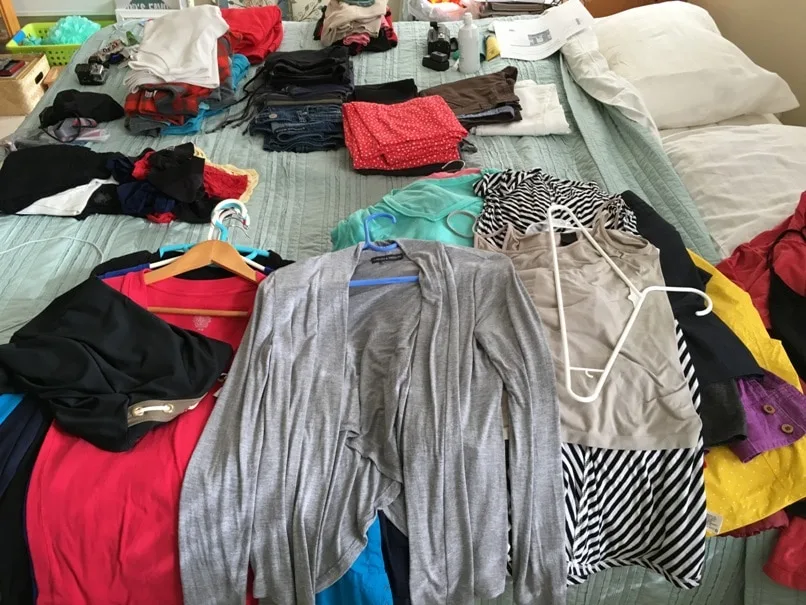
Surprisingly, it was clothing. We shared a tiny walk-in closet in our home. So we didn’t have a clothing wardrobe that was too out of hand. But styles change, waistlines grow, and clothing just doesn’t seem in tune with your style anymore.
We got rid of about four trash bags full of clothing – but we gave the items to family, tried selling via ThredUp (a spectacular failure that you can read all about), or donated to church charities.
After we got rid of furniture that we didn’t like but made sense in our townhouse at the time, there wasn’t TOO much stuff left that was cluttering our lives.
Sure, we had artwork and home décor and normal household items. But these things weren’t taking away too much time from our lives or creating a home that we didn’t like. The opposite was true. They made us happy, we enjoyed the memories behind them, or they were functional items (like rakes or gardening tools) that made sense and we utilized frequently.
Turns out, we weren’t hoarders. We weren’t drowning in clutter. We just had stuff that made sense in a house.
Related Posts:
- How to Be a Minimalist Without Giving Up Things
- Downsizing vs. Minimalism
- Minimalist Kitchen Essentials
- Best Gifts for a Minimalist
Myth About Selling All of Your Stuff for Profit
If there is one thing that I hate about people downsizing their life and promoting minimalism, it’s the myth that by selling your stuff, you’ll receive a sudden windfall.
Ugh. Where do I begin…….
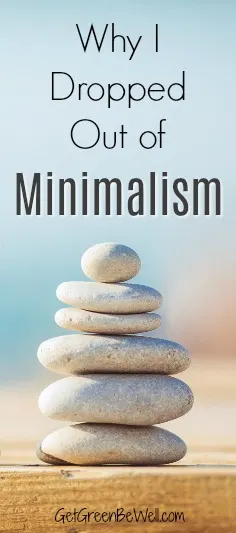
Okay. If you’re selling your house, you’re going to get a big fat check. ONLY if you already have lots of equity, you’re not underwater in your mortgage, you sell it for a great price and you can pay off all of your house-related debts and realtor costs and still walk away with a chunk of change.
Do you understand me? Selling your house doesn’t equal peace of mind and money to retire on. And you BETTER have a way to buy a house later on with whatever income you’ll have.
In today’s housing market, you might be shocked at how little you’ll get in return for the same amount of money that you sold your house for.
Just because you sell your 2,500 square foot house doesn’t mean you can pay cash for a 250 square foot tiny home and still have enough money to live on for years. It can happen, yes. I don’t think it happens to as many people as you might think, though.
If you’ve got a fancy car or truck, it’s the same thing. What can you sell it for compared to what you still owe on it? Once you get rid of it, what are your options for transportation? Can you really find an affordable, dependable vehicle that’s going to cost less? Can you utilize public transportation – and how much will it realistically cost? Will you be able to bike or walk all year long?
And then there’s all of your STUFF. Yes, the household goods, the furniture, the clothing, the toys. Everything that cost you a small FORTUNE and you took good care of it. You think it’s worth a lot of money, that people will be thrilled to buy what you have.
Don’t kid yourself.
Just because you went into debt for an item or paid a pretty penny in no way guarantees that anyone wants to pay you a decent amount of money for it.
In fact, you’ll be shocked at how little you’ll get for all of your stuff. (Here’s the best places to sell clothes online and what you’ll make.)
People don’t pay premium prices at garage sales. They don’t want to pay anything at all. That’s why they’re always haggling. Selling your stuff on Facebook groups or Craigslist won’t get you tons of money, either. These places are where people are trolling for BARGAINS, not where they want to pay fair value.
I made a video about how much money we got for all of our great quality stuff. I never posted it. Because I was SO upset when I realized what we gave away and how little we got for it.
We made $600 from selling solid wood bookcases, our end tables, a dining room table and chairs, lamps, clothing and other home décor items.
Let me tell you, these items cost a LOT more than $600 to buy. And they will take a LOT more than $600 to replace.
All of the time I spent posting on Facebook groups, chatting with potential buyers, scheduling appointments, being at home to show items and disrupting my routine for over a month only netted six hundred dollars.
I could have kept the stuff and worked and made more money than that.
But I didn’t. Now we don’t own any of the furniture anymore. And we didn’t even have enough money to cover the expense of the moving truck.
Doesn’t seem like a great thing, does it? Minimalism would have been saving my precious time not doing these things. Instead, I wasted my time trying to get rid of it all.
The Good and Bad of Minimalism
I’m not about to say that minimalism is all bad. It isn’t. But it’s not as great as all that, either.
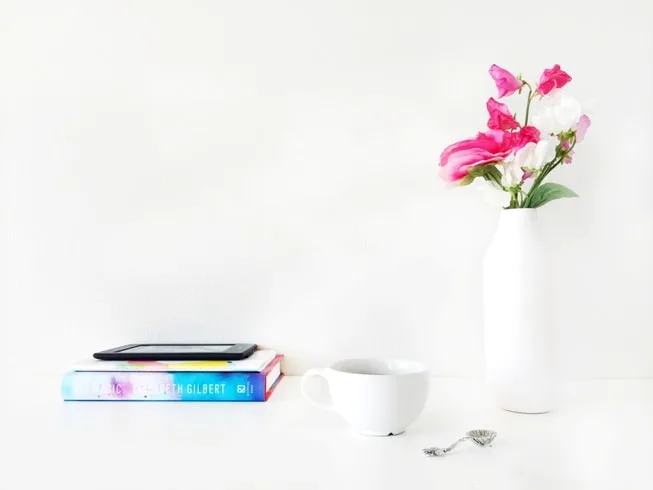
I don’t blog about minimalism. I don’t have a minimalism YouTube channel.
So here’s my unvarnished opinion:
What’s so good about minimalism?
- It does reduce your stress, IF your stress is about cleaning, owning and organizing stuff.
- It allows you to focus on what you love the most.
- You’ll require less room, less storage space, etc.
- You won’t spend as much money on accumulating stuff.
- You do truly realize that you need very little to survive and function daily.
- The less stuff you own, the more freedom you have to leave it all behind for a different opportunity.
What’s bad about minimalism?
- Replacing things you gave away is costly.
- You give away things that can never be replaced.
- Once you give up your possessions, you might find that it’s way more costly to replace them months or years later because of a booming market (such as housing, electronics, etc.)
- You can’t take advantage of sales or good deals if you don’t have room to store items.
- Shopping and decorating are hobbies and activities that can make you happy, as any other activity would.
- If every member of the family does not believe in minimalism, there can be a lot of conflict and stress.
- Giving away *stuff* doesn’t reduce your stress if your stress is unrelated to owning stuff.
- Being free to pick up and leave whenever you want is great. Yet switching jobs, not having a steady job or constantly changing housing can really impact your finances, especially your ability to get a mortgage or loans.
Your success with minimalism really is dependent on your own unique situation. If you only have your job so that you can make enough money to afford a too-big house, too many cars and too many shoes, then, yeah, minimalism might work for you.
If you like your job, your house works for you (even if you could give up a few pairs of shoes) and your stress is more related to relationships or other issues not related to STUFF, then minimalism isn’t going to be your cure-all answer.
Most of the negatives for me revolve around financial security (which is a REALLY big deal, y’all. Don’t kid yourselves). Which is ironic because people promote minimalism to save money and not be tied to a job. There is a lot to be said about peace of mind over years and decades and establishing a stable financial future, though, compared to living in the moment and sacrificing peace of mind in the future.
Why I Don’t Want to Be a Minimalist Anymore
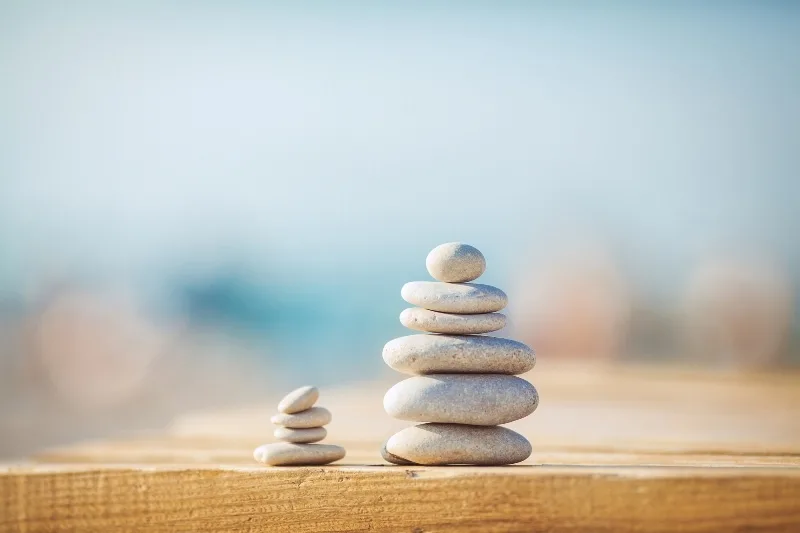
There is something to be said for simplicity. I admit, I enjoy not having to clean a huge house. Or worry about shopping to find the perfect piece of home décor.
But there’s also a lot to be said for those problems. They’re great problems, and ones that I’d love to have again.
Our stress never came from owning a house or paying for it. Our stress was directly related to a work environment. The desire for minimalism was only to have less financial stress in starting up a new career. However, minimalism hasn’t helped.
If we had decided to move into a house rather than traveling in an RV, we would have bought into a lower-priced housing market. We could have gotten more house for less money. We would have more equity and not have to worry about where to live over the next few years.
If we hadn’t given up half of our possessions, I wouldn’t be overwhelmed with the cost of trying to replace all of them. Getting something as nice as what we had costs even more in today’s economy.
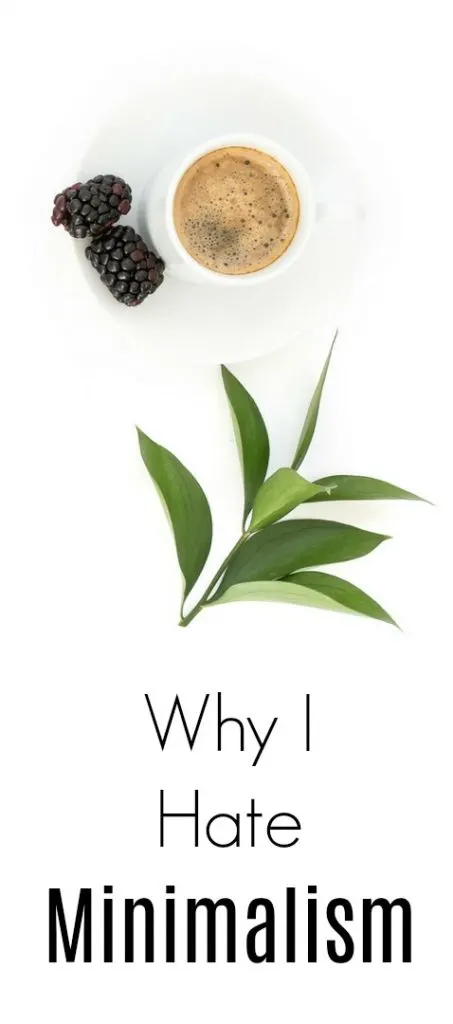
If we didn’t downsize, I wouldn’t be storing my 7 pairs of shoes in a kitchen cabinet because my bedroom closet is so small. I wouldn’t be in a house so small that my husband can hear my stomach growl when he’s in the living room and I’m in the bedroom with the doors closed.
I’d have room for my work – maybe in a separate office again – so that I wasn’t hogging the entire dining room table and we could actually eat on it again.
I’d love to have a big house, so that we could have accommodated friends and family who recently had to evacuate because of a hurricane. It would have made me happy to have offered up a place to stay for them. I’d love to have extra room so that friends could come visit us in North Carolina. Or my niece could come stay for a week and introduce her to hiking and nature.
There’s nothing wrong with large houses or lots of space if they are part of your lifestyle that makes you happy.
We were designing a 2 bedroom, 2 bath home before. Now I won’t settle for anything that small. I’ve seen what it’s like only having room for just enough of what you have. I don’t want to deal with that the rest of my life. I want a bigger house than I had originally planned, more bathrooms, more storage and more fanciness than ever before.
I like having piles of stuff that I need. Enough food in my freezer or pantry so that I can create something easy for dinner without having to go out to eat. I don’t like shopping for just a few days at a time because that’s all my refrigerator will hold. I want to SAVE TIME by being able to buy more all at once. And SAVE MONEY by being able to stock up on sales and deals, something that I can no longer do in a tiny home.
Not having a piece of clothing for a specific event or climate is frustrating to no end. As is the lack of closet space that I have. I’m not someone who buys new wardrobes for every different season. I hold onto my clothes for years on end. I take care of them. I don’t buy a lot of clothes, because I keep the ones that I have. There’s something minimalistic in that behavior.
Why do I have to get rid of everything so that I need to buy more down the road?
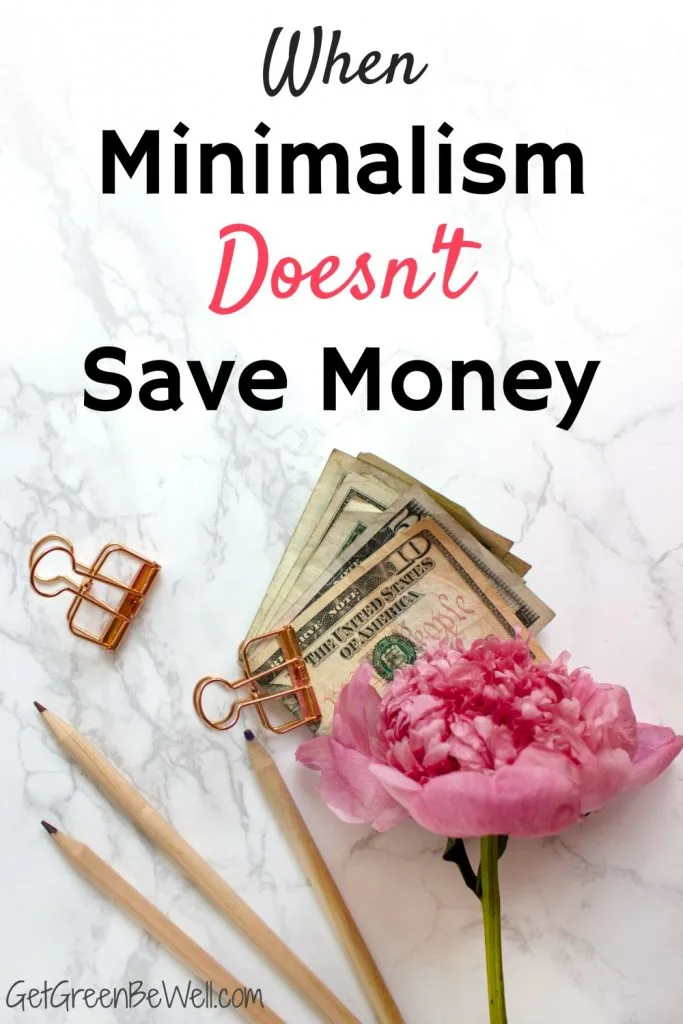
I have a friend who wanted to downsize and embrace minimalism. She had four grey sweaters. She loved wearing grey, because it was a neutral that she always wore to work. She got rid of three of the grey sweaters. Which left one. Which she accidentally lost somewhere. So she had to go buy a new one.
Does that make sense? Giving up something that you own and love and use all of the time for the sake of being minimalistic? Only to have to buy something new again?
The Most Important Thing to Declutter
In the end, I think the true wealth of minimalism would be if we were all minimalistic in our digital and information lives, and less in materialistic possessions. “Stuff” doesn’t own us. Obviously you can go overboard in owning stuff, but most of us aren’t too possessed by our belongings.
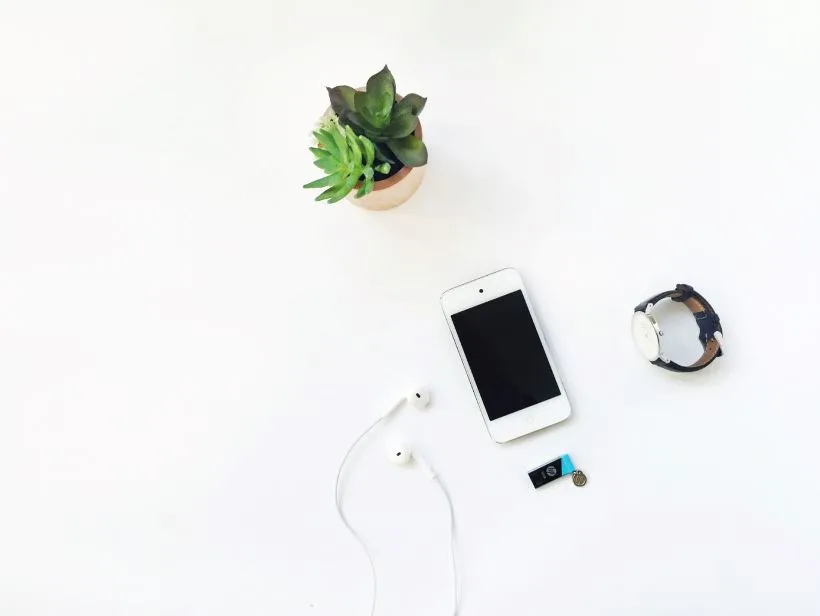
What we are burdened down with, though, is too much information.
- Too many people telling you that you need minimalism to be happy (when you thought you were already happy).
- Too many ads showing you unnecessary things that you need to buy.
- Too many political viewpoints, too much strife, too much hatred.
- Too many *things* to do – including scrolling through Facebook for an hour and leaving feeling worthless and like your life is boring.
What if we chose to embrace minimalism only in our technology? If you weren’t constantly comparing yourself to anyone else’s standards, would you be happier? Would you have more time to work on your hobbies or use your gardening tools if you weren’t stuck behind a computer screen endlessly posting to Pinterest?
Would you have more time and less stress in your life if you had less to follow on social media and the internet?
That’s the real question. And one that I think anyone who wants to try minimalism should do first. Can you honestly purge your technological habits and addictions to create a happier life? Throwing out stuff is easy. Changing your habits to live without stress is hard.
We all need stuff. We need a roof over our head. We need food to eat. We need clothing. These are basic necessities. We don’t need a LOT of them, but we need these things for our entire lives.
Putting yourself in a situation where you are financially strapped to replace these items is stupid and cruel.
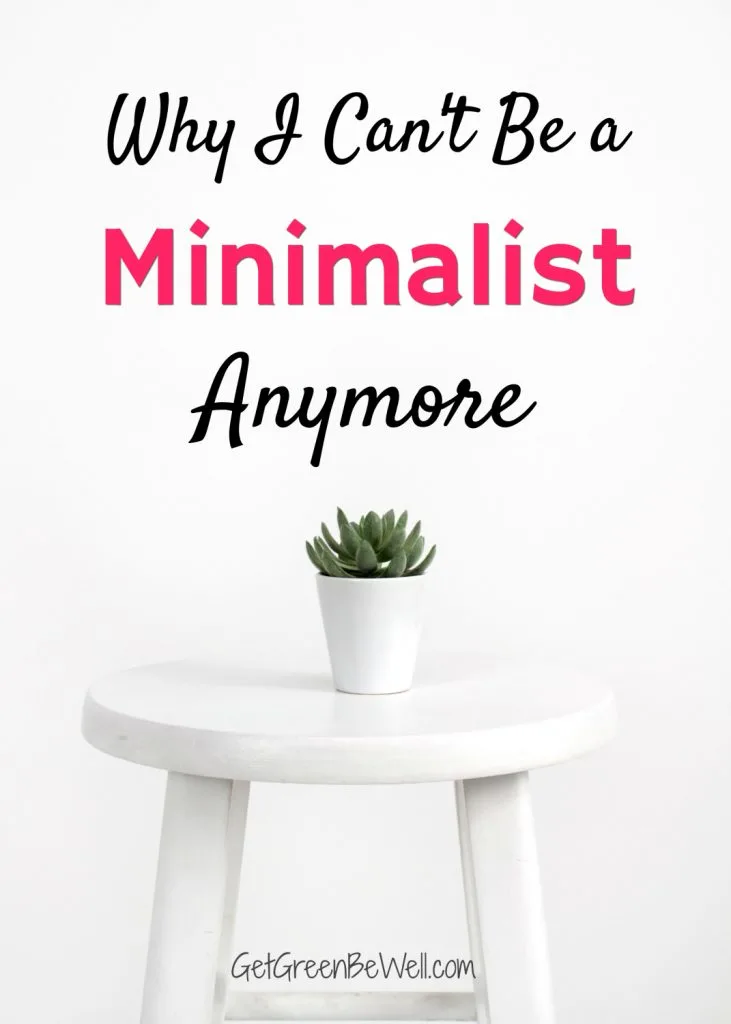
What we DON’T need, anymore, is to live our lives tethered to what artificial intelligence, social media or marketing campaigns want to force feed us. Including the pretty pictures and lofty ideals of minimalism. Yes, there’s something to be said for downsizing and only holding onto what makes us happy.
But I don’t hear a lot of people who are truly happy living their lives behind computer screens. I know of no one. So why not put minimalism to work where it’s needed the most? Purge technology.
And keep that closet full of clothes.
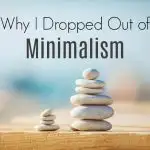
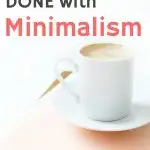
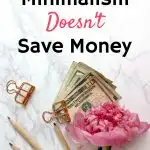
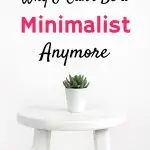
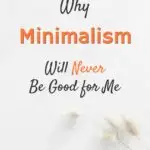
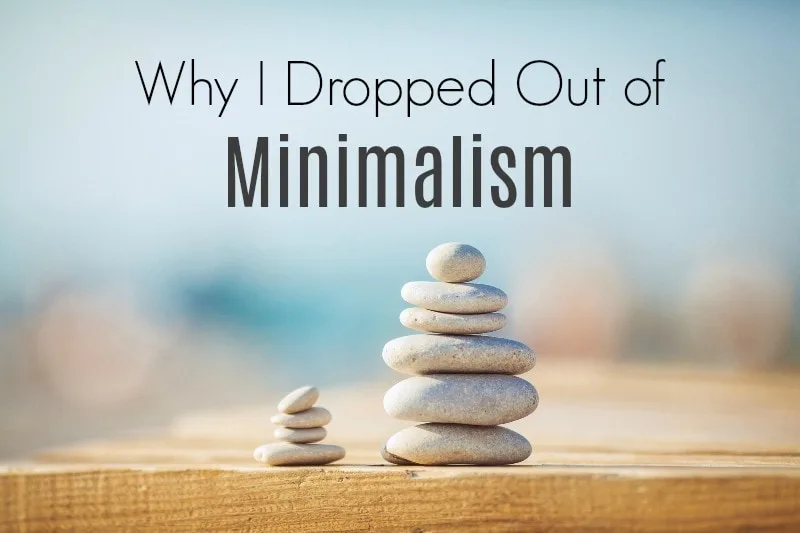
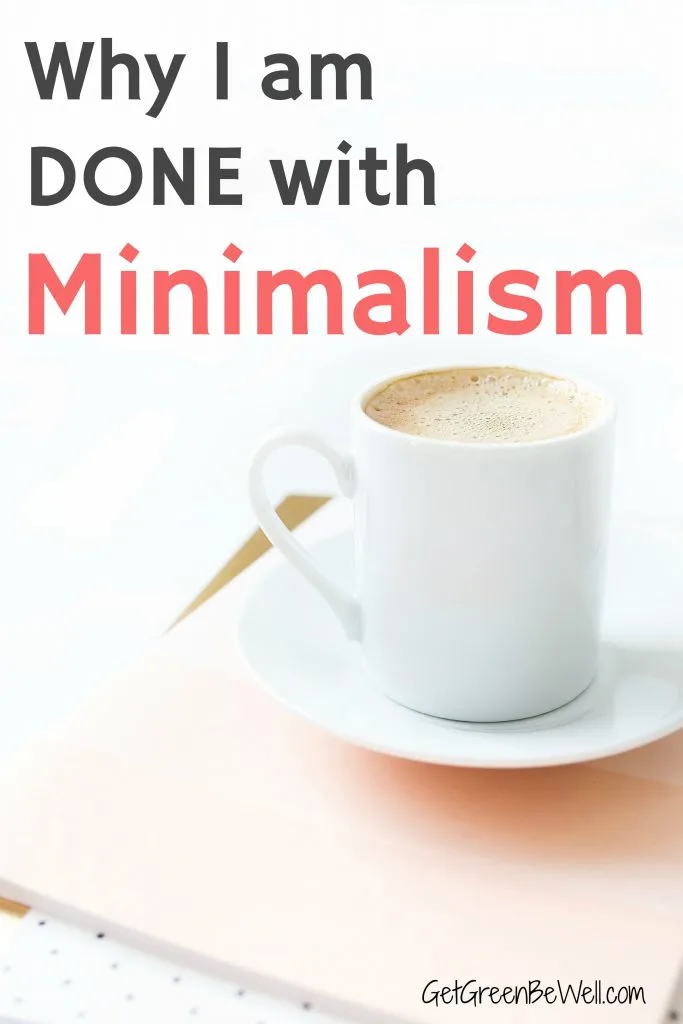
Ruth
Monday 13th of May 2024
I toyed with minimalism, got rid of a lot of things, including loads of fabric and other craft items, and clothes that were too small for me. I regret getting rid of all those resources! My life changed, I got more time, and I lost a lot of weight and was able to wear those smaller clothes again, some with modifications because they were hopelessly outdated, and I needed to alter the larger clothes and make some pieces that I couldn't buy, to fill in the gaps, and for that I needed fabric and other craft stuff. Thank goodness I didn't get rid of more than I did, but I've needed to buy replacements. Minimalism now seems to be a way of priming people to own nothing and (pretend to) be happy. It's good to be adaptable should one have to live somewhere smaller, or without certain things, but it's madness to deprive yourself of tools you only need (but then really need) once every two years, or vintage goods that were much higher quality and more durable than you can buy today.
Kimberly
Tuesday 14th of May 2024
Totally agree! I know of so many people that got rid of tons of crafting supplies and fabric only to regret it. The clothes, too. Great insights!!!
Mary
Saturday 16th of September 2023
Breath of fresh air. I do watch a few of these types videos when I want to do some basic decluttering. Some of the reasons for holding onto things people don't really even want make sense and spur me on to reducing my inventory. As an older person I have seen kids having to deal with their parents 'dying or downsizing into nursing homes and it has taken the kids months to clear their homes because they kept things like huge boxes of ketchup packages and rubber bands maybe because they lived through hard financial times. I'd like my kids final memories of me to be better than that. But yes, this is insane. I like a vase of flowers on my countertops and I need to have a coffeemaker there too. These totally bare kitchens look like no one lives there. And you are not OK if your countertops have one thing on them? Thanks for this perspective.
Kimberly
Sunday 24th of September 2023
Mary, I definitely agree! Thanks for leaving a comment!
Lynn
Friday 14th of April 2023
Just read this and need to say Thank you! Finally someone saying what I feel. As a non minimalist I have lots of materials to pursue creative hobbies, can function through power cuts and lockdowns, dress for any occasion in clean clothes, host parties, gatherings and friends to stay, do laundry economically when it suits me, enjoy living with things I love, cook a wide range of food without shopping daily, have space to breathe, stretch and relax
Kimberly Button
Tuesday 15th of August 2023
Yes!!!!
Julie
Sunday 25th of September 2022
Really appreciate your blog post! I’ve never felt so negative , stressed, and upset since starting minimalism. I get so negative when I see things that don’t look like what I see on Instagram or YouTube. Reading your article has made me reconsider my plans. I think that if I can make sure everything has a home and things look tidy and clean that should be good. I agree with all your points!
Kimberly Button
Thursday 29th of September 2022
Thanks, Julie! Yes, making sure everything is neat and tidy is just as stress-busting as trying to get rid of everything. Plus, you get to keep what you love!
Deb
Wednesday 27th of July 2022
Brilliant Article. Couldn’t agree more with you and Don Quixote. Thank you for your insight. It’s so easy to head down a path when it’s pushed into your face on a regular basis. I’ve felt guilty about keeping things that I love - that’s nuts!! Your thoughts are a breath of fresh air.